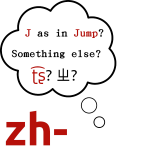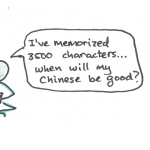Articles in the ‘Beginner’ category Page 19
-
Does using colour to represent Mandarin tones make them easier to learn?
Some learning materials, apps and tools allow you to add colours to show Mandarin tones, but is this really helpful? This article discusses the ins and outs of using colour to learn and remember tones, along with some practical considerations.
Read → -
How important is reading speed on tests like HSK and TOCFL?
Reading speed is an issue on proficiency tests like HSK and TOCFL. But how much of a problem is it? How fast do you need to read? This article discusses the role of reading speed on proficiency exams.
Read → -
How to look up Chinese characters you don’t know
Looking up an unknown character in Chinese is much trickier than looking up unknown words in most other languages. This article discusses various ways of looking up Chinese characters, including paper dictionaries, handwriting input, OCR and more.
Read → -
Can too much guidance make you learn less Chinese?
Guidance and support can make learning Chinese easier, but could too much of it make it harder? This article discusses the downsides of receiving too much help and the benefits of engaging more with the Chinese language on your own, without having everything explained to you.
Read → -
Training your Chinese teacher, part 3: Listening ability
Listening ability is generally overlooked in language teaching. At first glance, it might seem that having a teacher is not as useful for improving listening as it is for improving speaking, but is that really the case? This article covers both what you should and what you shouldn’t do with your teacher if improving listening ability is your goal!
Read → -
Two types of pronunciation problems and what to do about them
Many assume that when someone gets pronunciation wrong, they haven’t learnt how to produce that sound correctly yet. This is not always the case, though, because there is another reason that is perhaps even more likely to be the cause of the problem! What are the two types of problems and what can we do about them?
Read → -
New course: Unlocking Chinese – The Ultimate Guide for Beginners
Do you want to make sure your Chinese learning gets off to a good start? Or have you already started, but feel a bit confused and need guidance? Then my new course, Unlocking Chinese: The Ultimate Guide for Beginners, is for you!
Read → -
The nine principles of learning (and the mistakes from failing to follow them)
In 2014, Scott Young spent 100 days learning Chinese, after which he was able to speak freely on a wide range of topics, as well as pass HSK 4. Since then, he’s continued exploring effective learning and has now published a book called Ultralearning. He hasn’t abandoned Chinese, though, and in this article, he discusses nine important principles for effective learning and how they relate to studying Chinese.
Read → -
Review: Mandarin Companion: Easy to read novels in Chinese
Graded readers are an important step on your journey to becoming literate in Chinese. In this article, I review all books in the Mandarin Companion series, including both level 1 (300 characters) and level 2 (450 characters), as well as the new Breakthrough level (150 characters). These books are useful for both beginners (extra reading) and intermediate learners (extensive reading). In all, there’s roughly 100,000 characters worth of stories here, providing an effective and enjoyable way to learn to read Chinese.
Read → -
101 questions and answers about how to learn Chinese
This is the biggest collections of questions and answer about how to learn Chinese anywhere. The questions are sorted into categories, and each question is answered briefly before links to further information is provided. If you have a question about how to learn Chinese, you’re very likely to find the answer here! If your question hasn’t been answered, please consider leaving a comment!
Read →









